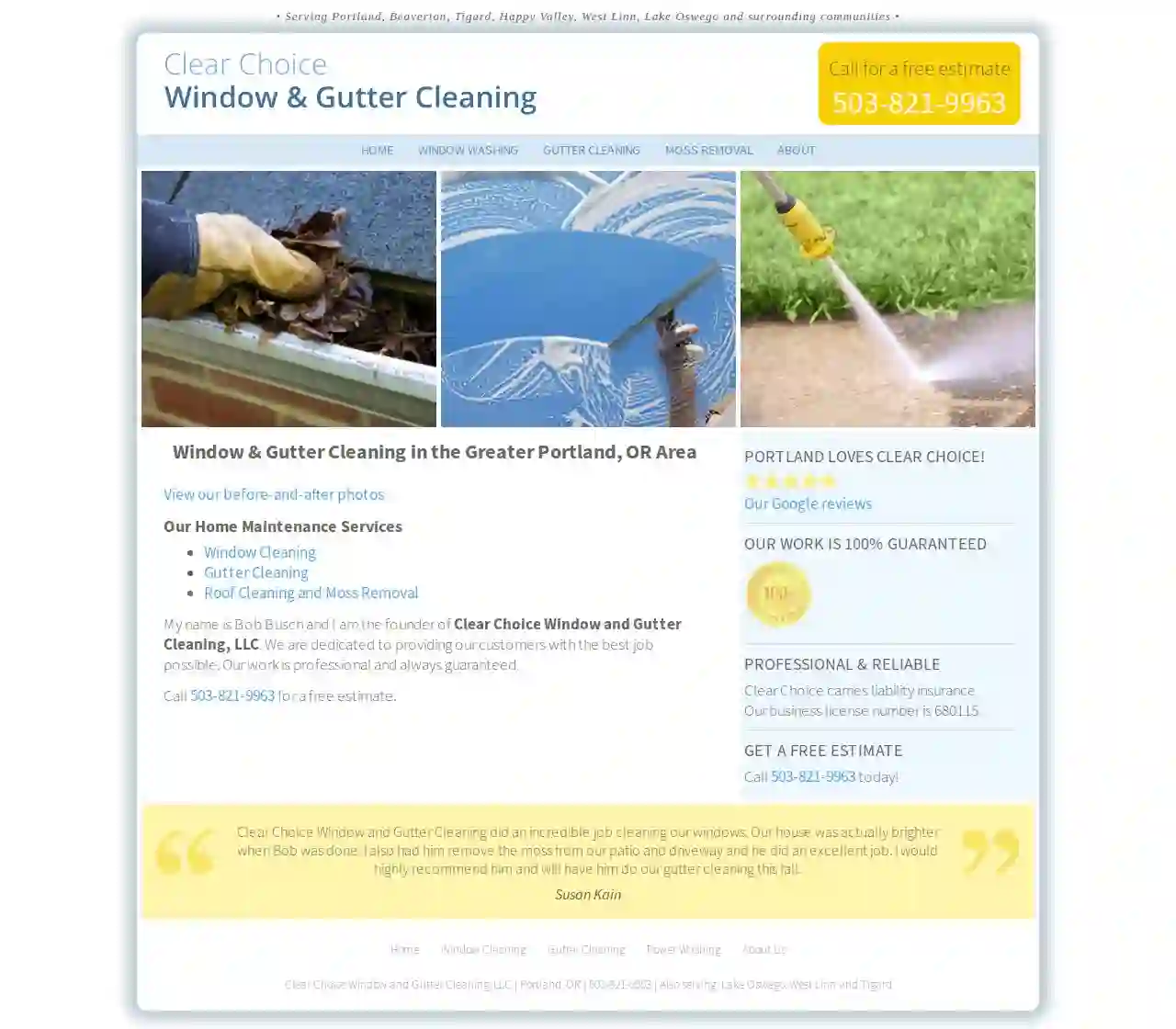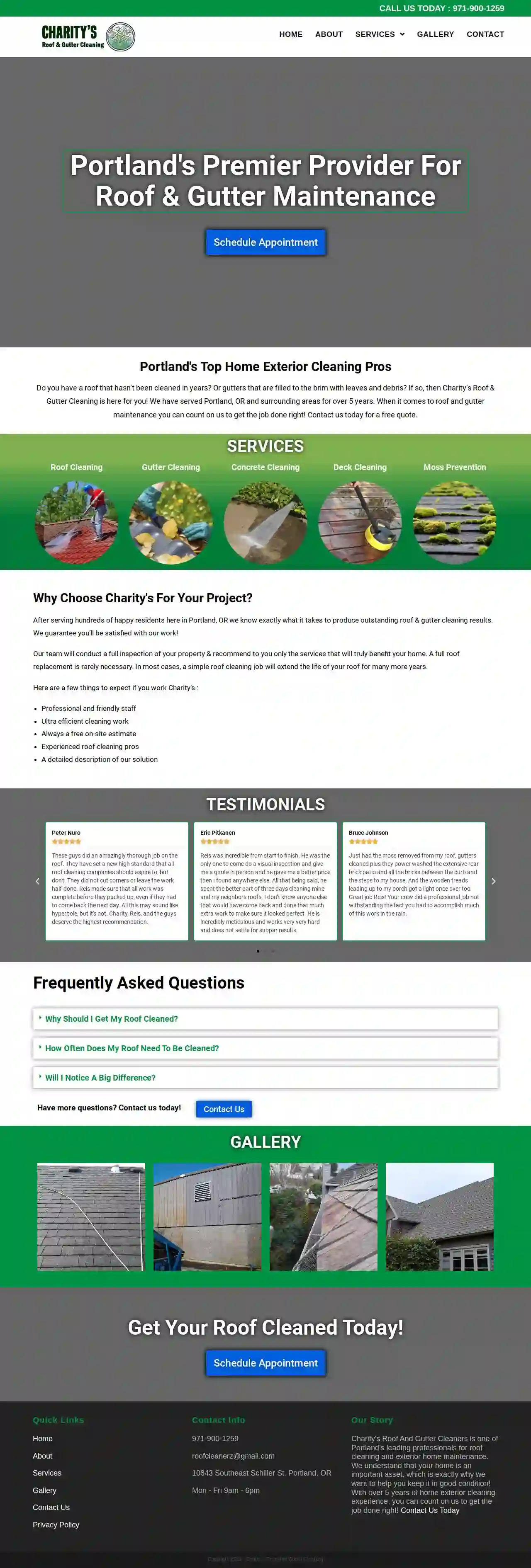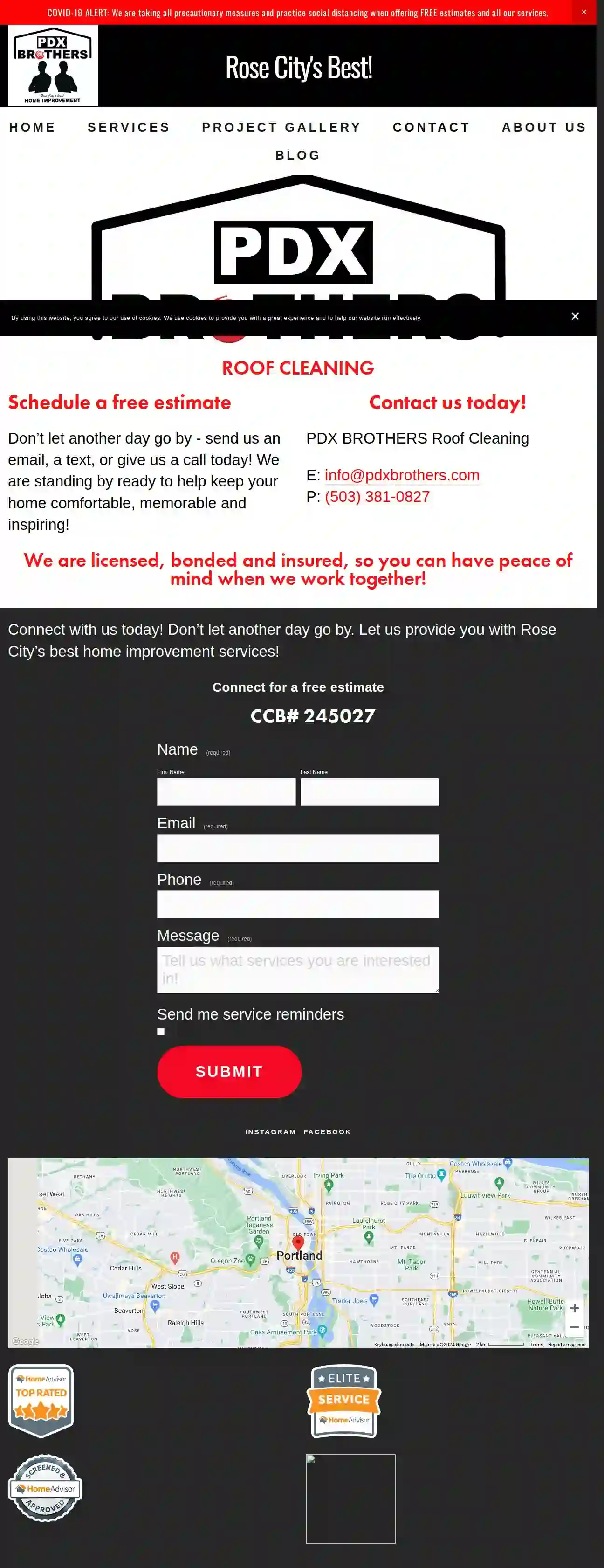Gutter Cleaning Augusta
Find Roof Gutter Cleaning in Augusta
Receive up to 3 Roof Gutter Cleaning quotes for your project today! Compare profiles, reviews, accreditations, portfolio, etc... and choose the best deal.

Gutter Empire LLC
4.996 reviews6952 SE Nehalem St, Portland, 97206, USGutter Empire LLC is a top-rated gutter company in Portland, OR. We value your time and work fast but efficiently. Our team of professionals is well-trained and knowledgeable about gutters. Knowledge is power, and we'll leave you with abundant gutter information that protects your home -and pocket- for a long time. We specialize in high-quality products and professionals and in maintaining absolute professionalism. Our responsibility is to make sure that your home is safe. So, we recommend the best option according to your requirements. After the work, our professionals will clean up the area and leave a clean and tidy home.
- Services
- Why Us?
- Accreditations
- Gallery
Get Quote
Vics gutter filters
4.517 reviewsPortland, 97214, USVic's Gutter Filters is a locally owned and operated business serving the Portland and Seattle areas. We specialize in providing high-quality gutter filter installation services at competitive prices. Our mission is to offer a permanent solution to clogged gutters, saving you time, money, and hassle. We understand the frustration and expense of recurring gutter cleaning. That's why we offer Leaf Blaster Pro, a patented gutter filter system that effectively prevents debris buildup, protecting your home from water damage and extending the lifespan of your gutters. At Vic's Gutter Filters, we pride ourselves on our commitment to customer satisfaction. We offer a 40-year warranty on our products and guarantee our workmanship. Our experienced and reliable team will ensure a seamless installation process, leaving your property clean and improved. We go the extra mile to ensure your complete satisfaction. Before installation, we'll clean and address any existing gutter issues, including moss removal, cleaning, realignment, resealing, and repairs. Why choose Vic's Gutter Filters? Quality Products: We use only the best Leaf Blaster Pro gutter filters, known for their superior performance and durability. Competitive Pricing: We beat most competitors' prices while offering higher quality materials. Customer Satisfaction Guaranteed: Your satisfaction is our top priority. We stand behind our work and products with a 40-year warranty. Experienced and Reliable Team: Our team is dedicated to providing professional and efficient service. Free Quotes: Contact us for a free, no-obligation estimate. Don't let clogged gutters become a problem. Call Vic's Gutter Filters today for a permanent solution and enjoy peace of mind knowing your home is protected.
- Services
- Why Us?
- Accreditations
- Gallery
Get Quote
American Seamless Gutters
510 reviewsPortland, USAmerican Seamless Gutters is the leading provider of high-quality gutter installation, cleaning, and repair services in Oregon and Washington. Founded in June 2019 in Portland, Oregon and Vancouver, Washington, our company prides itself on exceptional workmanship, professionalism, and dedication to customer satisfaction. Our skilled installers use the latest techniques and materials to ensure that your gutters are installed correctly and function optimally. We also offer gutter cleaning services to keep your gutters free from dirt, debris, and other obstructions that can cause damage to your home or building. Additionally, we provide top-notch moss removal, and fascia board replacement services to ensure your home or business is always in top shape. Trust our experienced team to provide expert solutions that will save you time and money while protecting your property year-round.
- Services
- Why Us?
- Gallery
Get Quote
Royal Gutters Inc
4.853 reviewsPortland, USRoyal Gutters is a premier gutter services company in the Portland Metropolitan Area and beyond. We specialize in gutter installation, gutter repair, and leaf gutter protection. Our team of experts uses high-quality, eco-friendly materials from the USA to bring you products you can feel confident in. We take pride in the quality and integrity that we are able to offer our clients. With no subcontractors and financing available, we are the one-stop gutter shop for all your gutter needs.
- Services
- Why Us?
- Gallery
Get Quote
Crux Roof & Gutter Cleaning
4.968 reviews3536 SE Sellwood St., Milwaukie, 97222, USAt Crux Roof & Gutter Cleaning, we take pride in delivering affordable, honest, and high-quality cleaning services to our customers. With years of experience in the industry and a commitment to customer satisfaction, we specialize in roof cleaning, gutter cleaning, and pressure washing. Our quotes are always free and we book in days not weeks! As part of our commitment to the community we offer seasonal discounts and on going discounts to veterans, teachers, churches, and other non-profits*. We offer two moss removal methods; Soft Wash using soft bristle brushes and Abrasion using wire brushes. A pressure washer is never used on your roof. We use the mop and squeegee method for most windows. We wet the windows with a cleaning solution and then clean using a squeegee. Siding and exterior gutters are cleaned using a Soft Wash method to maintain the integrity of your paint. Concrete surfaces are expertly cleaned using pressure washers and finished with a treatment for a superior clean.
- Services
- Why Us?
- Gallery
Get Quote
All Weather Pros Home Services
59 reviewsPortland, Oregon, 8255 Southwest Canyon Lane, 97225, USAll Weather Pros Home Services is a fully licensed and insured business providing gutter cleaning, roof cleaning, window cleaning, pressure washing, window screen repair, and holiday lighting services. Locally owned in Beaverton, Oregon, the company is committed to providing the best possible service to each customer every time with the highest value given. With 18 years of experience in the home service industry, owner and operator Allen Stiebritz prioritizes safety, communication, and timely results. When not working, Allen enjoys outdoor activities and spending time with his family.
- Services
- Why Us?
- Our Team
- Gallery
Get Quote
Clear Choice Window and Gutter Cleaning
4.927 reviewsPortland, OR, 123 Main St, 97202, USClear Choice Window and Gutter Cleaning, LLC is a professional window and gutter cleaning company serving the Greater Portland, OR area. Our team, led by founder Bob Busch, is dedicated to providing exceptional service and ensuring 100% customer satisfaction. We offer a range of services, including window cleaning, gutter cleaning, roof cleaning, and moss removal. Our work is guaranteed, and we carry liability insurance. We serve Portland, Lake Oswego, West Linn, Tigard, and surrounding communities.
- Services
- Why Us?
- Accreditations
- Our Team
- Testimonials
- Gallery
Get Quote
Portland Gutter Company | Gutter Pro Northwest
51 reviews3204 X Street, Vancouver, 98663, USPremier Gutter Experts Serving the Vancouver, WA and Greater Portland Area With over 20 years in business, Gutter Pro NW provides the highest quality gutter services to our customers. 5 Star customer rated Transparent pricing and estimates Over 20 years serving the community Warrantied Products, Guaranteed Service Fully Licensed, bonded, and insured in both Washington and Oregon Choosing your gutter team in the Pacific NW is important. We specialize in keeping your home safe from rainwater damage. What sets us apart? Our skilled team ensures perfect gutter performance, backed by years of experience and a track record of delighted customers. If your home’s gutters need attention, trust the experts at Gutter Pro who prioritize your satisfaction. Reach out for a free estimate today.
- Services
- Why Us?
- Accreditations
- Testimonials
- Gallery
Get Quote
Charity's Roof an Gutter Cleaning
4.711 reviews10843 Southeast Schiller St., Portland, 97266, USCharity's Roof And Gutter Cleaners is one of Portland’s leading professionals for roof cleaning and exterior home maintenance. We understand that your home is an important asset, which is exactly why we want to help you keep it in good condition! With over 5 years of home exterior cleaning experience, you can count on us to get the job done right!
- Services
- Why Us?
- Our Team
- Testimonials
- Gallery
Get Quote
PDX BROTHERS Roof Cleaning & Roof Moss Removal
571 reviews1050 Southwest 6th Avenue, Portland, 97204, USAt PDX BROTHERS, our mission is simple: to provide top-quality roof cleaning and moss removal solutions that surpass customer expectations. We understand that a clean and moss-free roof not only enhances the aesthetic appeal of your property but also safeguards its structural integrity. With this in mind, we have set ambitious goals to deliver impeccable service, ensuring that each and every customer receives the highest level of satisfaction. Other services: Gutter cleaning and Pressure washing. We are licensed, bonded and insured, so you can have peace of mind when we work together! PDX Brothers: Trusted experts in roof cleaning, gutter cleaning, and roof moss removal, serving Portland, Beaverton, Hillsboro and surrounding areas with guaranteed service and a 2-year 'NO MOSS' warranty.
- Services
- Why Us?
- Accreditations
- Testimonials
- Gallery
Get Quote
Over 60,241+ Janitorial Companies onboarded
Our janitorial pros operate in Augusta and beyond!
CleaningMatch has curated and vetted the Best Cleaning Contractors in Augusta. Find a reliable pro today.
Frequently Asked Questions About Gutter Cleaning
- Regular Gutter Cleaning: Cleaning gutters at least twice a year prevents debris buildup and ensures proper water flow.
- Tree Trimming: Trim trees and branches near your roofline to reduce leaf and debris accumulation in gutters.
- Gutter Guard Installation: Installing gutter guards can significantly reduce debris buildup and minimize cleaning needs.
- Regular Inspections: Inspect your gutters regularly for signs of damage, such as cracks, leaks, or sagging.
- Prompt Repairs: Address any gutter damage promptly to prevent further deterioration and water damage.
- Small House: Cleaning gutters on a small, single-story house may take 1-2 hours.
- Large or Multi-Story House: Cleaning gutters on a larger or multi-story house can take 3-4 hours or more.
- Prevent Ice Dams: Clogged gutters can contribute to the formation of ice dams in the winter, which can trap heat inside your attic, leading to higher energy bills.
- Protect Insulation: Overflowing gutters can cause water to seep into your attic, damaging insulation and reducing its effectiveness.
- Prevent Mold Growth: Clogged gutters can lead to moisture buildup, creating a favorable environment for mold growth, which can affect indoor air quality and require energy-intensive remediation.
- Reduced Leaks: Seamless gutters have fewer seams, reducing the likelihood of leaks developing over time.
- Improved Appearance: Seamless gutters create a more aesthetically pleasing and streamlined look along your roofline.
- Less Maintenance: Fewer seams mean less opportunity for debris to accumulate, reducing the frequency of cleaning needed.
How can I prevent gutter problems?
By taking these preventive steps, you can protect your home from water damage, extend the lifespan of your gutters, and minimize the need for costly repairs.
How long does it take to clean gutters?
Additional services like gutter repair or gutter guard installation will add to the overall time required.
Can gutter cleaning improve my home's energy efficiency?
By preventing these issues, gutter cleaning indirectly supports energy efficiency in your home.
What are seamless gutters, and are they better than sectional gutters?
Advantages of Seamless Gutters:
While seamless gutters offer advantages, sectional gutters are typically more affordable and easier to repair if a section becomes damaged. The best choice for your home depends on your budget, aesthetic preferences, and the length and complexity of your roofline.
How can I prevent gutter problems?
- Regular Gutter Cleaning: Cleaning gutters at least twice a year prevents debris buildup and ensures proper water flow.
- Tree Trimming: Trim trees and branches near your roofline to reduce leaf and debris accumulation in gutters.
- Gutter Guard Installation: Installing gutter guards can significantly reduce debris buildup and minimize cleaning needs.
- Regular Inspections: Inspect your gutters regularly for signs of damage, such as cracks, leaks, or sagging.
- Prompt Repairs: Address any gutter damage promptly to prevent further deterioration and water damage.
By taking these preventive steps, you can protect your home from water damage, extend the lifespan of your gutters, and minimize the need for costly repairs.
How long does it take to clean gutters?
- Small House: Cleaning gutters on a small, single-story house may take 1-2 hours.
- Large or Multi-Story House: Cleaning gutters on a larger or multi-story house can take 3-4 hours or more.
Additional services like gutter repair or gutter guard installation will add to the overall time required.
Can gutter cleaning improve my home's energy efficiency?
- Prevent Ice Dams: Clogged gutters can contribute to the formation of ice dams in the winter, which can trap heat inside your attic, leading to higher energy bills.
- Protect Insulation: Overflowing gutters can cause water to seep into your attic, damaging insulation and reducing its effectiveness.
- Prevent Mold Growth: Clogged gutters can lead to moisture buildup, creating a favorable environment for mold growth, which can affect indoor air quality and require energy-intensive remediation.
By preventing these issues, gutter cleaning indirectly supports energy efficiency in your home.
What are seamless gutters, and are they better than sectional gutters?
Advantages of Seamless Gutters:
- Reduced Leaks: Seamless gutters have fewer seams, reducing the likelihood of leaks developing over time.
- Improved Appearance: Seamless gutters create a more aesthetically pleasing and streamlined look along your roofline.
- Less Maintenance: Fewer seams mean less opportunity for debris to accumulate, reducing the frequency of cleaning needed.
While seamless gutters offer advantages, sectional gutters are typically more affordable and easier to repair if a section becomes damaged. The best choice for your home depends on your budget, aesthetic preferences, and the length and complexity of your roofline.